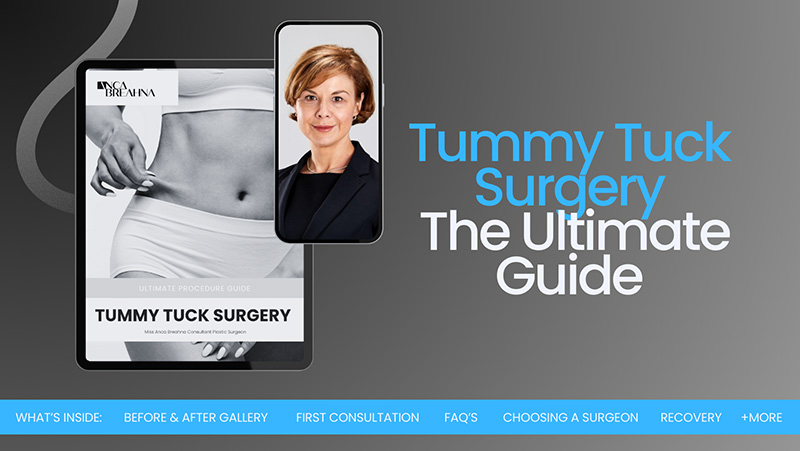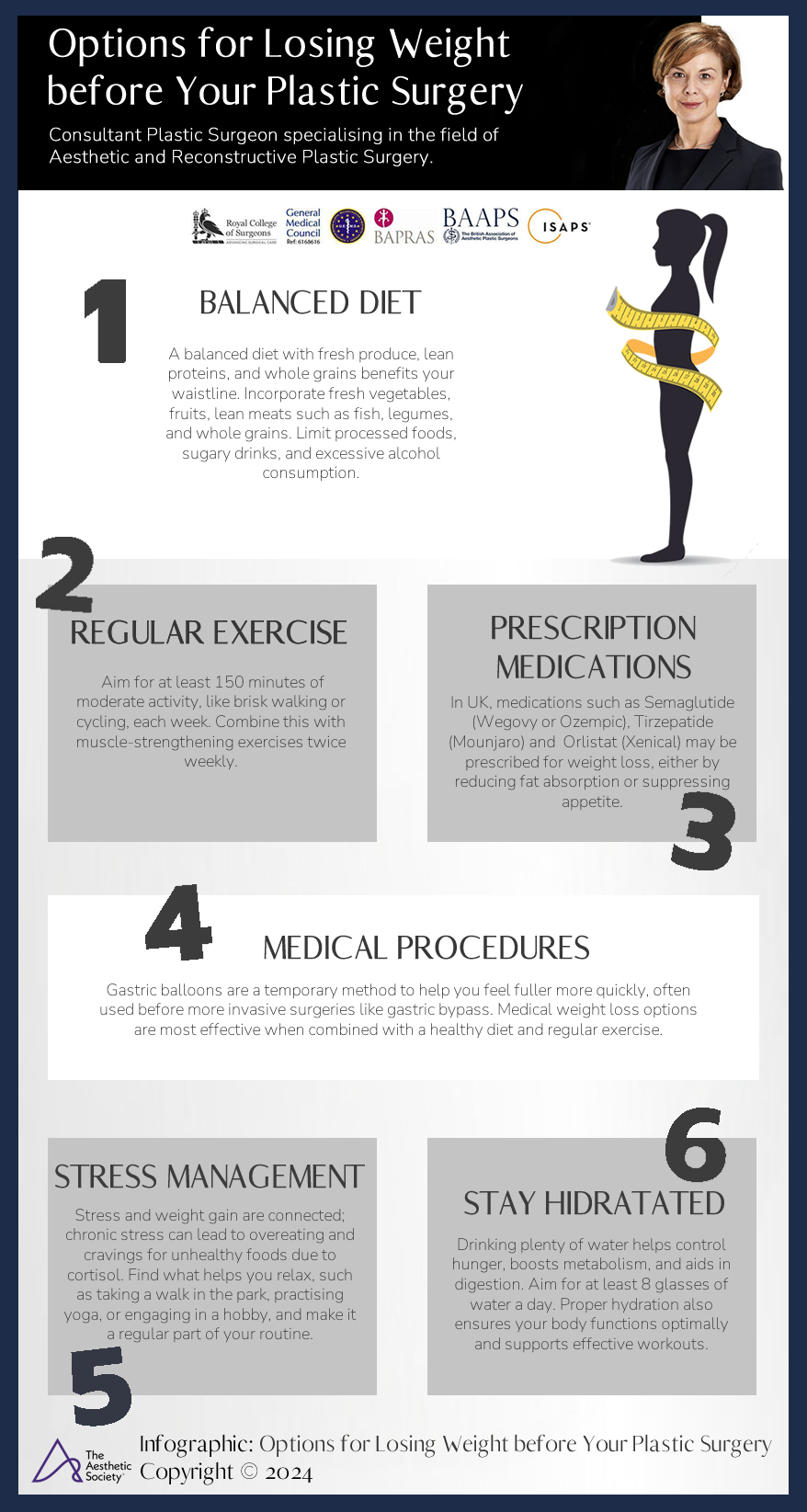
- How Your BMI Impacts Abdominoplasty Results
- Download Anca Breahna’s Tummy Tuck Guide
- Tummy Tuck Surgery
- Ideal Candidates
- BMI and Tummy Tuck Surgery
- What is BMI?
- BMI Criteria for tummy tuck Surgery
- Why Your Weight and BMI Matter
- Preparing for Tummy Tuck Surgery - Achieving a Healthy Weight
- Weight Loss Strategies
- Consultation with a Specialist
- FAQs about Tummy Tuck Surgery and BMI
- What is the ideal BMI for tummy tuck surgery?
- Can I undergo tummy tuck surgery if my BMI is above 30?
- How does BMI affect recovery from tummy tuck surgery?
- Is there a weight limit for tummy tuck surgery?
- How long before tummy tuck surgery should I reach my ideal BMI?
- Will losing weight after tummy tuck surgery affect my results?
- Can tummy tuck surgery help me lose weight?
- What if I gain weight after tummy tuck surgery?
- How can I lower my BMI before tummy tuck surgery?
- Are there any exceptions to the BMI guidelines for tummy tuck surgery?
- Can tummy tuck surgery be performed on individuals who have had significant weight loss?
- Further Reading about Tummy Tuck Surgery with Chester Consultant Plastic Surgeon Anca Breahna
- Medical References about Tummy Tuck Surgery and BMI
How Your BMI Impacts Abdominoplasty Results
The journey to undergoing tummy tuck surgery involves more than just the decision to improve one’s abdominal appearance. It requires patients to be in a state of optimal health and fitness, with particular emphasis on being at a healthy weight. The role of Body Mass Index (BMI) in determining the eligibility and predicting the outcomes of abdominoplasty cannot be overstated. Being aware of the interplay between a healthy weight, BMI, and tummy tuck surgery outcomes is crucial for anyone considering this procedure.
In this blog, Chester Consultant Plastic Surgeon Anca Breahna will discuss the importance of having a healthy weight before the tummy tuck procedure and how the BMI can influence the procedure results.
Download Anca Breahna’s Tummy Tuck Guide

Tummy Tuck Surgery
Tummy Tuck surgery, or abdominoplasty, is a cosmetic surgical procedure that aims to remove excess skin and fat from the abdomen and restore weakened or separated muscles, resulting in a smoother and firmer abdominal profile. This procedure is particularly beneficial for patients who have gone through significant weight loss, pregnancy, or ageing, leading to sagging skin and weakened abdominal muscles that cannot be corrected through exercise alone. The primary goal of tummy tuck surgery is not weight loss but the enhancement of the abdominal area’s overall appearance by tightening muscles and removing excess skin and fat.
Ideal Candidates
The ideal candidates for tummy tuck surgery are individuals who are in good general health, have a realistic expectation of the surgery’s outcomes, and are at or near their ideal body weight. Being close to one’s ideal weight is crucial because it minimises surgical risks and enhances the aesthetic results of the procedure. Moreover, candidates should have stabilised in their weight loss journey, if applicable, as significant fluctuations post-surgery can affect the longevity and success of the results. It’s also important for candidates to have a positive outlook and specific goals in mind for the improvement of their abdominal area’s appearance.
A healthy weight not only ensures the safety of the procedure but also significantly impacts the quality of the results. Weight and body composition play important roles in how the body responds to surgery and heals afterward. Excess body fat, particularly in the abdominal area, can increase the risk of complications during surgery and negatively affect the healing process, leading to less than satisfactory outcomes.
Therefore, individuals considering tummy tuck surgery are advised to achieve and maintain a healthy weight before the procedure. This preparatory step is essential for minimising surgical risks, ensuring a smoother recovery, and achieving the best possible aesthetic results. Prospective patients should engage in a balanced diet and regular exercise regimen and consult with healthcare professionals or Anca to create a personalised plan for reaching their ideal weight pre-surgery.
Tummy Tuck surgery offers a promising path to achieving a firmer, more aesthetically pleasing abdominal profile. However, the journey to this transformation requires careful preparation, with a significant focus on achieving a healthy weight.
BMI and Tummy Tuck Surgery
BMI is a measure calculated from a person’s weight and height, providing a reliable indicator of body fatness for most people and categorising them into various weight status categories that can impact health. When it comes to abdominoplasty, BMI is not just a number; it’s a critical factor that plastic surgeons use to assess a candidate’s surgery readiness and predict the procedure’s success and safety.
What is BMI?
BMI is calculated by dividing a person’s weight in kilograms by the square of their height in meters (kg/m^2). The result places individuals in one of the following categories: underweight (BMI less than 18.5), normal weight (BMI 18.5–24.9), overweight (BMI 25–29.9), and obese (BMI 30 and above). This classification helps healthcare providers, including plastic surgeons, make informed decisions about patient care and surgical eligibility.
BMI Criteria for tummy tuck Surgery
Most plastic surgeons recommend a BMI of less than 30 for candidates considering tummy tuck surgery. This recommendation stems from extensive evidence linking higher BMI levels with increased risks of surgical complications, such as infections, wound healing problems, and blood clots. Furthermore, patients with a BMI higher than 30 may not achieve the optimal aesthetic results due to the presence of visceral fat (fat around the internal organs), which cannot be addressed through abdominoplasty.
Lowering BMI to within the recommended range before undergoing tummy tuck surgery is therefore not only about maximising the visual outcomes but also about prioritising patient safety. It’s about ensuring that the body is in the best possible condition to handle the stress of surgery and the demands of the recovery process. Anca may advise patients with a BMI over 30 to lose weight before the procedure to reduce these risks and improve the surgery’s effectiveness.
Why Your Weight and BMI Matter
Weight and BMI are not just numbers; they are indicators of your health status and play a crucial role in determining the safety and success of your surgery:
- Surgical Risks and Complications: Higher BMI levels are associated with an increased risk of complications during and after tummy tuck surgery. Patients with a higher BMI are more prone to developing surgical site infections, experiencing slower wound healing, and having an increased risk of blood clots (venous thromboembolism). Additionally, anaesthesia risks are higher in overweight and obese patients, which can complicate the procedure and recovery process. By achieving a healthier weight, these risks can be significantly minimised, making the surgery safer and recovery smoother
- Impact on Results: The aesthetic outcomes of tummy tuck surgery are closely linked to a patient’s weight and BMI at the time of the procedure. Patients who are at or near their ideal weight typically enjoy more dramatic and pleasing results. This is because the removal of excess skin and fat, combined with the tightening of abdominal muscles, is more effective when there is less visceral fat and the skin’s elasticity is not compromised by excessive weight gain or loss. Moreover, patients at a healthier weight are more likely to maintain the results of their surgery long-term, as significant weight fluctuations after abdominoplasty can alter the appearance of the abdomen
Preparing for Tummy Tuck Surgery – Achieving a Healthy Weight
For those considering tummy tuck surgery, taking steps to achieve a healthy weight is an important part of the preparation process. It not only enhances the safety and outcomes of the surgery but also contributes to overall well-being. Learn more about the benefits of an Anti-Inflammatory Diet before Plastic Surgery.
Weight Loss Strategies
Adopting a balanced diet and regular exercise routine is fundamental for anyone looking to reduce their BMI before tummy tuck surgery. Consulting with a nutritionist or dietitian can provide personalised dietary advice that supports healthy weight loss, while a fitness professional can design an exercise program tailored to individual needs and limitations. It’s important to approach weight loss as a gradual process, focusing on sustainable lifestyle changes rather than quick fixes.
Consultation with a Specialist
Before embarking on a weight loss journey, consulting with a healthcare provider or a plastic surgeon is essential. These professionals can assess your overall health, determine an ideal weight range for surgery, and provide guidance on safe and effective weight loss strategies. In some cases, Anca may also recommend working with other specialists, such as dietitians or personal trainers, to ensure comprehensive support throughout the weight loss process.
Achieving a healthy weight before tummy tuck surgery is more than a prerequisite; it’s a commitment to ensuring the best possible outcomes and the highest level of safety. By understanding the role of BMI in tummy tuck surgery and taking proactive steps to manage weight, candidates can significantly improve their chances of a successful and satisfying transformation.
FAQs about Tummy Tuck Surgery and BMI
What is the ideal BMI for tummy tuck surgery?
- The ideal BMI for tummy tuck surgery is generally considered to be below 30. This range is recommended to minimise surgical risks and optimise the aesthetic outcomes of the procedure.
Can I undergo tummy tuck surgery if my BMI is above 30?
- While it’s possible, individuals with a BMI above 30 are at a higher risk for complications. It’s advisable to lower your BMI to below 30 through a healthy diet and exercise regimen before undergoing the surgery for safer and better results.
How does BMI affect recovery from tummy tuck surgery?
- A higher BMI can lead to a longer recovery period and increase the risk of complications such as infections and wound healing issues. A healthy BMI can contribute to a smoother and quicker recovery process.
Is there a weight limit for tummy tuck surgery?
- There isn’t a strict weight limit, but Anca often recommends patients be within 10-15 pounds of their ideal weight. This guideline helps ensure that the patient can achieve the best possible results from the surgery.
How long before tummy tuck surgery should I reach my ideal BMI?
- It’s advisable to reach and maintain your ideal BMI for at least 6 months before undergoing tummy tuck surgery. This stability in weight helps ensure that the results are lasting and that your body is well-prepared for the procedure.
Will losing weight after tummy tuck surgery affect my results?
- Significant weight loss after tummy tuck surgery can affect the appearance of your abdomen, possibly leading to additional loose skin. It’s best to maintain a stable weight post-surgery to preserve the results.
Can tummy tuck surgery help me lose weight?
- A tummy tuck surgery is not a weight-loss procedure. It’s designed to remove excess skin and fat and to tighten abdominal muscles, which can improve the contour of the abdomen but does not significantly reduce body weight.
What if I gain weight after tummy tuck surgery?
- Weight gain after tummy tuck surgery can alter the results, potentially stretching the skin and affecting the overall appearance of the abdomen. It’s important to follow a healthy lifestyle to maintain the surgery’s outcomes.
How can I lower my BMI before tummy tuck surgery?
- Lowering your BMI involves a combination of a balanced diet, regular physical activity, and possibly consultation with a nutritionist or personal trainer. It’s important to approach weight loss in a healthy and sustainable manner.
Are there any exceptions to the BMI guidelines for tummy tuck surgery?
- Exceptions may be considered on a case-by-case basis, depending on an individual’s overall health, body composition, and specific circumstances. It’s essential to discuss your unique situation with Anca.
Can tummy tuck surgery be performed on individuals who have had significant weight loss?
- Yes, tummy tuck surgery is often recommended for individuals who have experienced significant weight loss and are left with excess skin. It’s important that their weight has stabilised before undergoing the procedure.
Further Reading about Tummy Tuck Surgery with Chester Consultant Plastic Surgeon Anca Breahna
- Read more about Mini Tummy Tuck Vs Full Tummy Tuck
- Read more about What to Expect during Recovery after Tummy Tuck
- Read more about When Can I Exercise after Tummy Tuck Surgery?
- Read more about How Much Is a Tummy Tuck in the UK?
- Read more about Myths and Facts about Tummy Tuck Surgery
- Read more about Causes and Solutions for an Apron Belly
Medical References about Tummy Tuck Surgery and BMI
- Why is BMI so important for Abdominoplasty? – ASAPS
- The Effect of Body Mass Index on Outcome of Abdominoplasty Operations
- Abdominoplasty and Patient Safety: The Impact of Body Mass Index and Bariatric Surgery on Complications Profile
- Quality of life and predictive factors for complications in patients undergoing abdominoplasty after gastric bypass
- Tummy tuck – Mayo Clinic
Back to blog



 Ms Anca Breahna, PhD, MSc, FEBOPRAS, FRCS (Plast) is a highly regarded Consultant Plastic Surgeon specialising in the field of Aesthetic and Reconstructive Plastic Surgery. Anca performs a range of
Ms Anca Breahna, PhD, MSc, FEBOPRAS, FRCS (Plast) is a highly regarded Consultant Plastic Surgeon specialising in the field of Aesthetic and Reconstructive Plastic Surgery. Anca performs a range of 